Key takeaways:
- Legislative transparency fosters public trust and engagement by making the legislative process open and accessible.
- Clear communication in plain language is essential for citizens to understand and participate in legislative discussions effectively.
- Privacy advocates play a crucial role in promoting transparency around data practices, educating the public on their rights.
- Challenges like overwhelming information, complex jargon, and political motivations hinder effective legislative transparency.
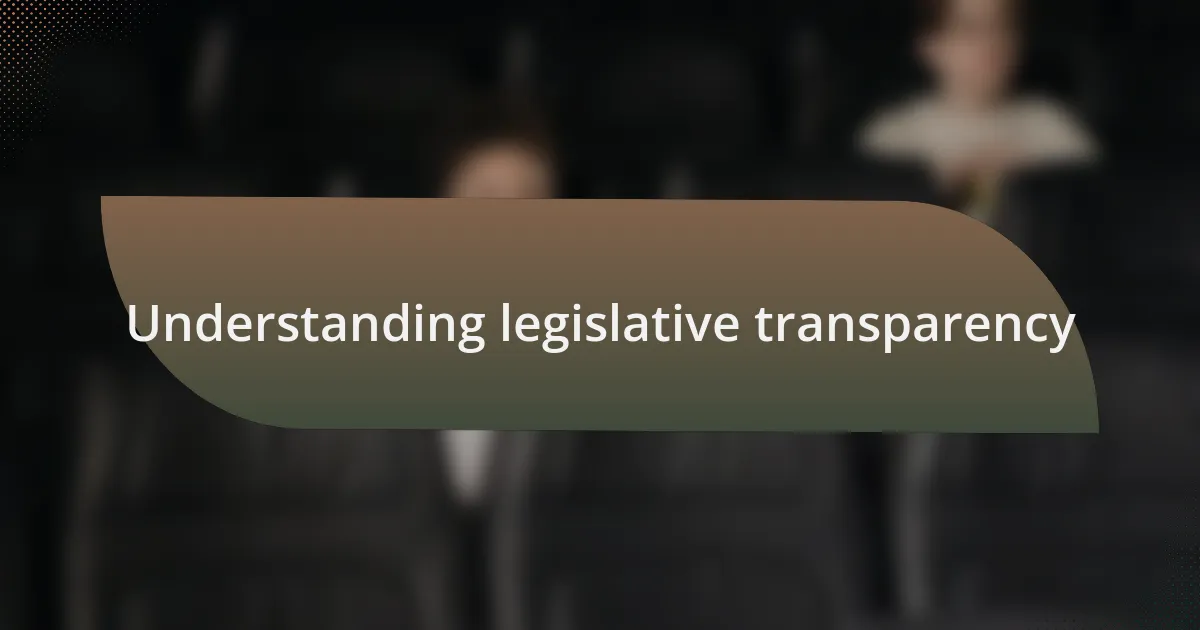
Understanding legislative transparency
Legislative transparency is all about making the legislative process open and accessible to the public. It’s astonishing how many citizens feel disconnected from the decisions being made in their name. When I first started to explore this topic, I was struck by how a lack of transparency can foster distrust in government. How can we expect citizens to feel engaged and informed when the processes feel shrouded in secrecy?
Transparency involves not just sharing information but ensuring that it is presented clearly and understandably. I remember attending a public meeting where complex legal jargon turned a simple proposal into a confusing labyrinth. It made me realize how essential it is for lawmakers to communicate in plain language, inviting everyone to participate in the discussions that affect our lives.
In my experience, engaging the public through transparent legislative processes cultivates a more informed electorate. When I discovered how easy it can be to access legislative records online, I felt empowered. It sparked curiosity in me and made me wonder—how many others miss out on insights simply because they’re unaware of the information available? Legislative transparency isn’t just a policy; it’s an invitation for all of us to take part in our democracy.
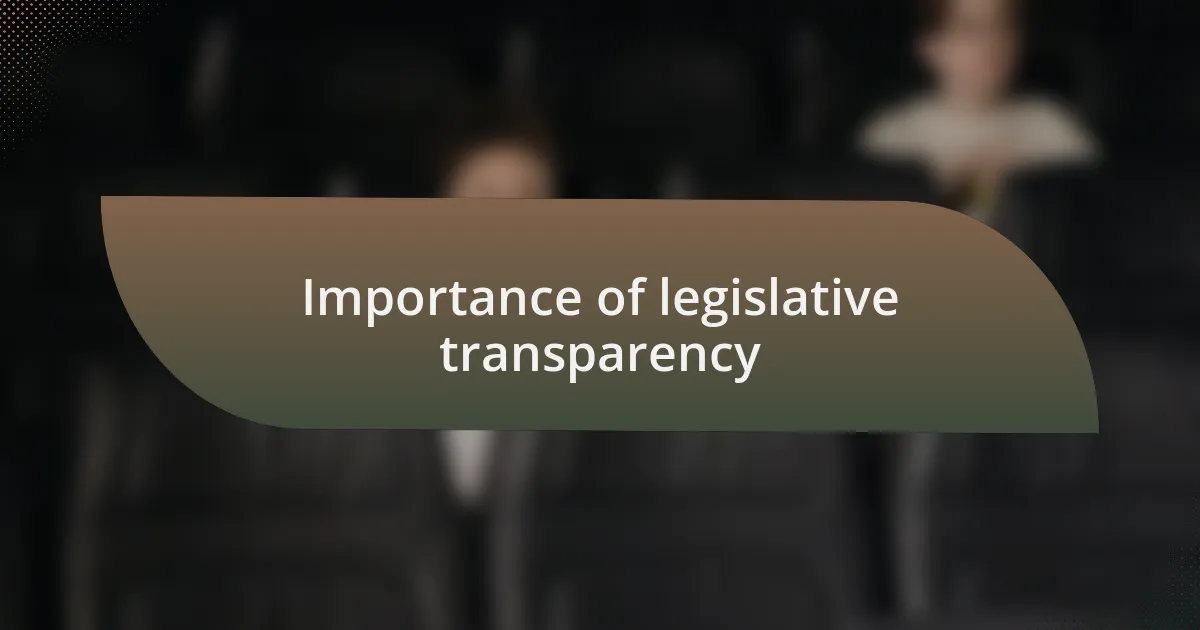
Importance of legislative transparency
Legislative transparency plays a crucial role in fostering accountability amongst lawmakers. I recall a time when a policy proposal in my community faced significant pushback simply because the public felt blindsided by its implications. Without clear communication or insight into the legislative process, mistrust can fester, leading citizens to question the very motives behind decisions being made. Isn’t it disheartening when a lack of clarity drives a wedge between the government and the governed?
Furthermore, transparent legislative processes encourage civic engagement, allowing citizens to voice their opinions and influence outcomes. I remember feeling invigorated after attending a town hall where the representatives actively solicited feedback on a proposed bill. That experience reminded me that when people know their voices matter, they’re more likely to engage. How can we build a vibrant democracy if citizens don’t feel their input is valued?
Lastly, legislative transparency enhances the quality of the laws being enacted. I’ve seen instances where community feedback led to changes in proposed legislation that made it more effective and considerate of local needs. What a difference it makes when the law reflects the voice of the people! By prioritizing transparency, we can build a legislative process that not only serves the interests of the few but represents the collective will of the many.
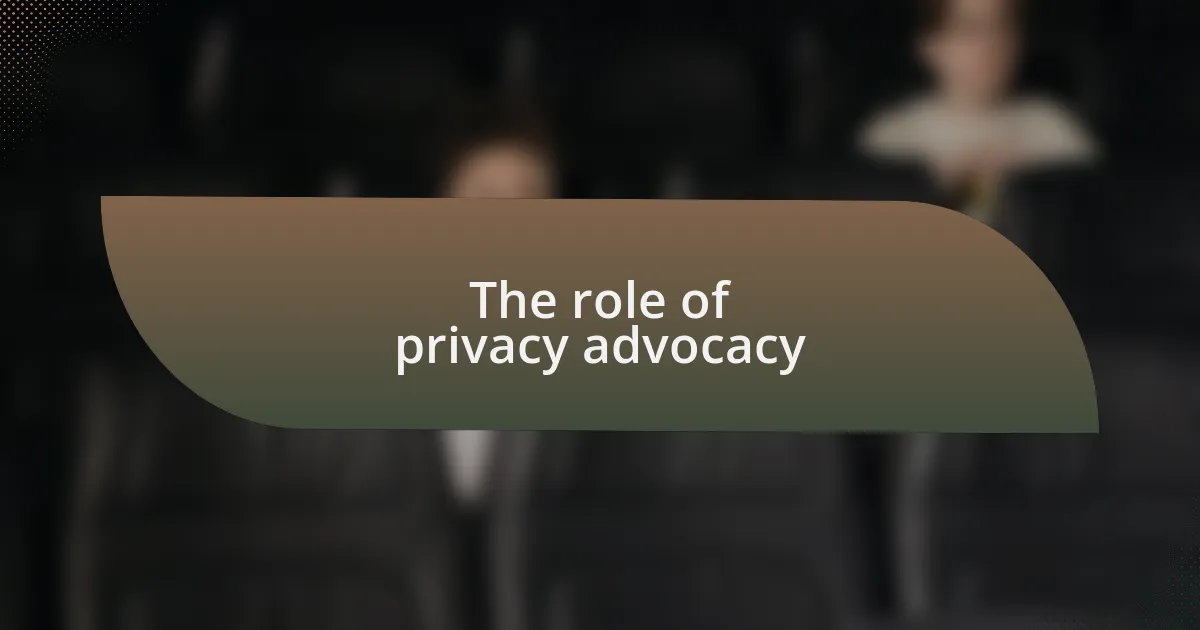
The role of privacy advocacy
Privacy advocacy occupies a fundamental role in our society today, particularly as technology evolves and data collection becomes more pervasive. I recall a time when I learned about a data breach at a company I trusted; their lack of transparency left me feeling vulnerable and betrayed. This experience underscored how essential it is for advocates to push for not only policies that protect individual data but also for organizations to be open about their data practices. If companies are not held accountable, how can we expect them to prioritize our privacy?
Moreover, privacy advocates serve as crucial watchdogs, educating the public on complex issues surrounding data rights and personal information. I remember attending a workshop where an advocate broke down the implications of privacy regulations in a way that made it all digestible. It was enlightening to see how empowering knowledge can be; when people are informed about their rights, they become more engaged in protecting those rights. Isn’t it empowering to feel you have agency over your personal information?
Through persistent advocacy, these professionals can influence policies and ensure that privacy considerations are not sidelined in legislative discussions. I often think back to a campaign I joined, which highlighted the necessity of including privacy impact assessments in new laws. Witnessing firsthand how collective voices can guide legislative change was both inspiring and motivating. When advocates unite to prioritize privacy, it demonstrates a powerful commitment to safeguarding our fundamental rights against encroachment.
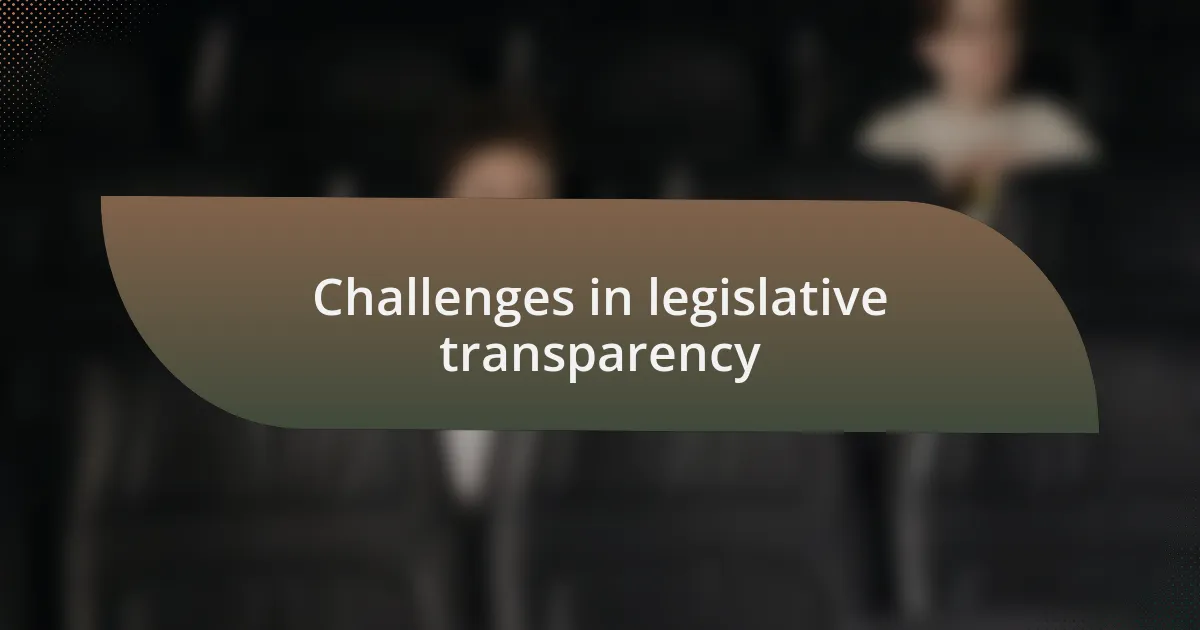
Challenges in legislative transparency
One significant challenge in legislative transparency is the sheer volume of information that lawmakers handle. I remember attending a city council meeting where they discussed multiple bills that directly affected our community. It was overwhelming to see how much was on the agenda, making it easy for essential details to get lost in the shuffle. How can citizens stay informed when the information is buried under layers of bureaucracy?
Another obstacle stems from the jargon and technical language often used in legislative documents. I recall reading a proposed law that was riddled with legal terminology, leaving me scratching my head and wondering who could genuinely understand it. This barrier can deter laypeople from engaging with the legislative process, isolating them from important decisions that impact their lives. Is it fair that only those with specialized knowledge can access meaningful participation in democracy?
Lastly, there’s the issue of political motivations that can cloud transparency efforts. I can’t forget a conversation with a fellow advocate who expressed frustration over hidden agendas that often accompany new legislation. When transparency takes a backseat to political maneuvering, trust in elected officials erodes. How can we believe in our representatives if we feel they are not fully revealing their intentions?
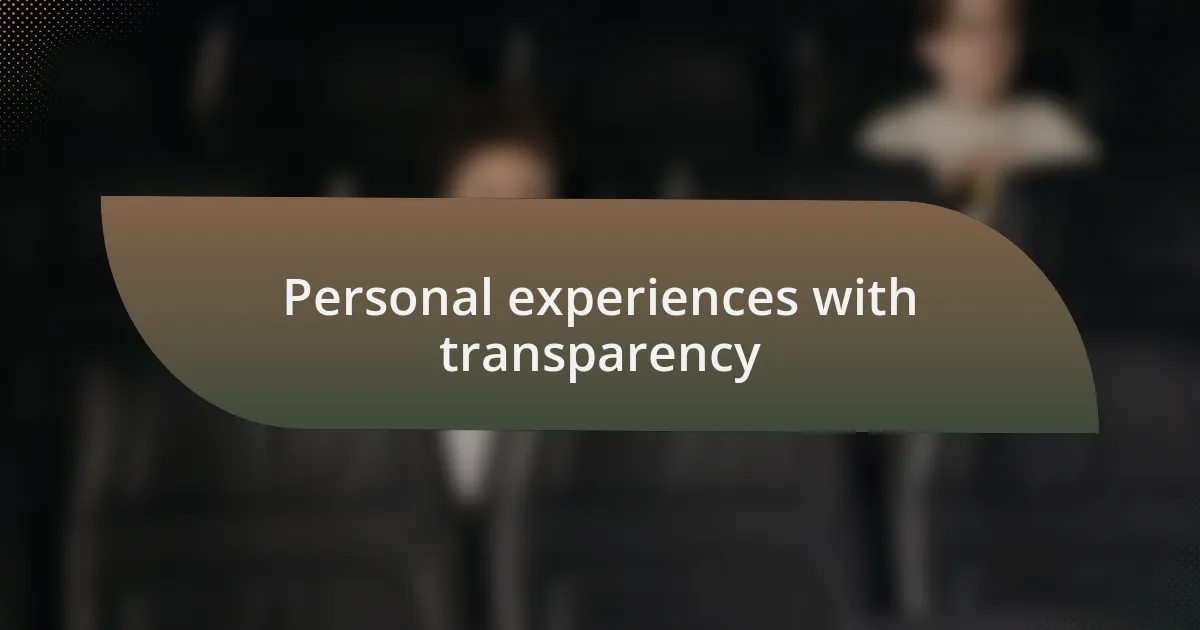
Personal experiences with transparency
When I think back to my experience with legislative transparency, I can’t help but recall a time when a new public safety bill was introduced in my town. I decided to dive into the details, eager to understand what changes might be coming. As I sifted through the dense packet of information, I felt a mix of excitement and frustration—it was like trying to decode a foreign language. How can we expect meaningful public engagement when the very system meant to protect us often keeps us in the dark?
I also remember a particularly eye-opening moment during a community forum focused on environmental regulations. Advocates presented findings on pollutants near our schools, yet the legislators struggled to explain the implications of their decisions clearly. The disconnect hit me hard; here were lives affected, yet the information flowed like a tightly guarded secret. Shouldn’t lawmakers be more willing to share the impact of their choices in a way that everyone can grasp?
Seeing the power of transparency firsthand, I attended a workshop on open government initiatives. Listening to passionate individuals share their experiences ignited a spark in me. Many had differing perspectives on how transparency—or the lack thereof—had affected their communities. Reflecting on those stories, I wondered: how many other voices remain unheard due to opaque legislative processes? The call for clear communication is not just a preference; it’s a necessity for a healthy democracy.
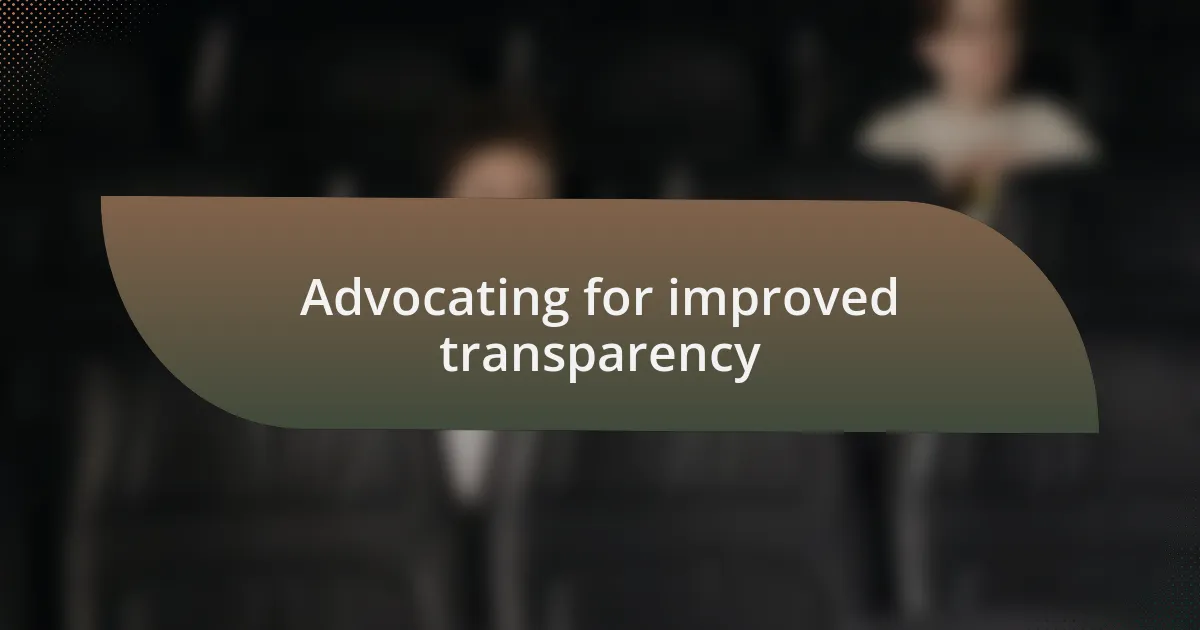
Advocating for improved transparency
When I participated in a town hall meeting regarding proposed changes to local zoning laws, I was shocked by the lack of accessible information. Many community members left confused, unsure of how these changes might affect their properties. This raises a critical question: if citizens can’t comprehend the implications of legislative actions, how can we claim to have a truly participatory democratic process?
During a recent advocacy event, I overheard a conversation between two parents grappling with a new education policy. They were frustrated by ambiguous language that left them questioning whether their children would receive necessary resources. This moment highlighted something troubling: in the absence of transparency, fear and misunderstandings flourish, eroding trust in our representatives. I couldn’t help but wonder, why is it so hard for lawmakers to present information in a straightforward manner?
In another instance, I collaborated with a local organization aiming to raise awareness about healthcare reforms. We crafted a simple, engaging infographic summarizing complex legislative proposals. To my surprise, the community’s response was overwhelmingly positive. It made me realize that clear communication fosters engagement and empowers individuals to hold their leaders accountable. Isn’t it time we push for a standard that mandates transparency? The need for clarity is real, and it’s a responsibility we must collectively champion.
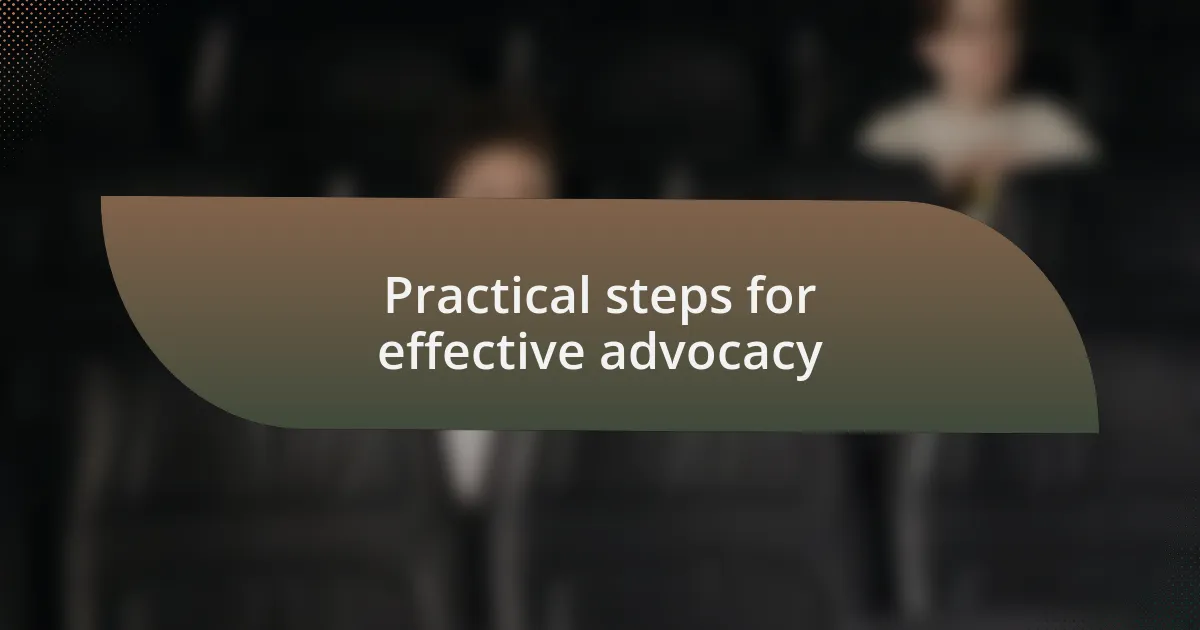
Practical steps for effective advocacy
To advocate effectively for legislative transparency, one practical step is to engage directly with your local representatives. I recall attending a community forum where I took the opportunity to ask pointed questions about recent proposed bills. The honesty and openness that emerged from that exchange not only clarified my concerns but also encouraged others to voice their opinions. How often do we miss these opportunities to connect personally with those in power?
Another vital action is to organize small workshops or discussion groups focused on current legislation. I once participated in a gathering where we analyzed a proposed budget. The dynamic discussions that followed revealed diverse perspectives and fostered deeper understanding among attendees. I left feeling empowered, thinking about how this approach could cultivate an informed and active public. Why not create more spaces for these conversations?
Lastly, leveraging social media platforms can amplify advocacy efforts. I remember sharing a well-researched post about a critical privacy law that caught the attention of many in my network. It sparked discussions and led to a collective response to our lawmakers. Isn’t it fascinating how a single post can ignite a movement? By using accessible language and engaging visuals, we can turn online interactions into powerful tools for change.